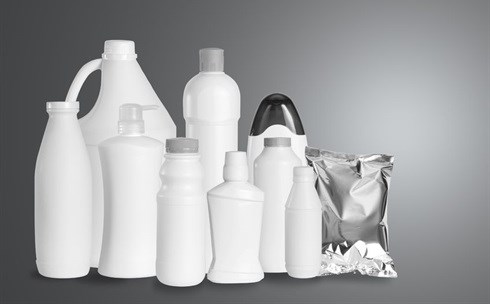It's pretty difficult to read my pieces and not notice that I'm an activist at heart... I was born a rebel without a cause actually, and have simply found causes to champion along the way.
The other thing that I know is that I'm not the only person like this out there, especially not in the marketing and media industries, where so many of us sensitive, caring souls tend to land up.
So, fellow marketing and media peeps, how have we let the packaging problem get so badly out of hand? And why are we still not really doing anything about it, or even really talking about it like it's the big deal that it is?
We are the voices, we are the people at the very genesis of the packaging problem - and we have the power to make a real on-the-ground difference that circumvents the need to try and better educate the often-uneducatable man in the street.
More than that, we have the power to mitigate the negative impact the power- and money-hungry business world is having, simply by what we choose to expose them to when we present the options.
Get to know your plastics
There are only two types of plastics that can be recycled - HDPE & PET. They are marked number 1 and number 2 when you look at the now-prominent recycle logo we've become so accustomed to seeing.
The sad truth is that even when you do recycle these plastics, they mostly can't be reused for packaging and land up being used to make plastic furniture or plastic decking.
Where they can be recycled into packaging containers, like the plant bottle we've all become so accustomed to seeing, only 30% recycled material can be used, meaning 70% virgin plastic is utilised every single time.
All the other types of plastic, everything not marked or marked 3 through 7, is merely shipped away and dumped into landfills, with a huge part of it landing up floating in our oceans.
No, there aren't any pictures of these huge plastic islands floating in the oceans because the macro pieces photo-degrade into smaller micro pieces and are floating just below the surface, where they are often eaten by fish.
In fact, in a fish as small as 2,5-inches you'll find up to 83 pieces of plastic, and in autopsies I've seen of the albatrosses around the Midway Atoll, up to 75% of the average chick's stomach is filled with plastic. Not only is the thought of that disgusting, but the plastic absorbs all kinds of chemicals like DDT that leech into the fishes' very flesh and from there make their way into all the flesh of all the animals in the food chain, including humans.
If you didn't know, plastic is made of oil and the levels to which oil prices can soar, and ultimately impact the cost of your packaging and therefore the overall product price, is argument enough when trying to convince a client to make a more environmentally-friendly packaging choice.
Receipts and thermal papers
As the marketing industry, we often drive new innovations - we're the creatives, after all. Well, ladies and gents, we urgently need an alternative solution to receipts as quickly as possible.
These plastic-coated thermal papers are swimming in Bisphenol-A or BPA, an estrogen-like compound found in many plastics. Tests have shown that simply holding the receipt in your hand allows the BPA to leech through your skin into your system.
This hormone compound is found in the vast majority of plastic products and has already been banned from baby bottles. When you think about it, it could also be a major contributing factor behind the excessive weight gain and infertility issues we're seeing all around the world.
Eliminating receipts where possible not only minimises the amount of plastic-coated paper that goes into landfills, but could also be a major cost-saving exercise for retailers.
So for accounts and loyalty cards, could we not have our receipts stored and accessible electronically? Could we not have them emailed to us? Or alternately, could we not have the receipts logged against our debit or credit cards when we choose to pay electronically? Or could we simply ask if people want a slip or receipt before we go to the cost of printing them out at the till?
Cheap toys and give-aways
Is it really necessary for us to give away a cheap, made-in-China toy with every kiddies meal? These items have no longevity and largely end up on a dump because they break so quickly. Wouldn't the money better be spent on giving some sort of loyalty discount as an incentive to come back?
Get smart about packaging
So much of the packaging we use is redundant - do you really need a plastic-coated paper box if you already have a plastic tray inside it? Do you really need a glued paper label or plastic wrap on a glass or plastic bottle? Does fruit really need to be presented in moulded styrofoam and wrapped in clingwrap?
If we're going to get smart about recycling, we need to make it as simple as possible, so limit your packaging to one material per element. It's perfectly possible to print onto glass and even plastics, and that makes it a ton easier to recycle, too.
We need strong voices
This is far from just about packaging and receipts and give-aways though: as writers and voices who contribute on a daily basis, it's really time we roll up our sleeves and jump in and help.
The activists who are out there trying to make an impact don't have our smarts, and they certainly don't have the access to the marketing and PR machines that we steer and influence from the inside.
Many of them are small organisations, driven by activists who really care but don't have the budget or know-how to manage much more than a couple of poorly-distributed press releases a year, and maybe a newsletter.
So become a voice - when you see an issue that deserves talking about, then use your pull and knowledge to get the message out there. Exercise your moral and ethical rights and question the information that's put in front of you - especially when it's designed to lobby against environmental and social causes.
And if you have to be backhanded about it because you're forced by the client to distribute that piece, then make sure that those pieces don't get adequate coverage... it's kind of like a go slow and you know how to make that happen.
You can make a difference
We can all make a difference, and the biggest impact we're going to make is if there are lots of us doing small day-to-day things on an ongoing basis. Don't let them convince you that you are powerless, because you aren't. You are powerful beyond measure because you make the actual detailed decisions.
As the cogs that keep these industries turning, we really have the power to create a strong and united voice and make it easy for the man in the street to do the right thing.
And ultimately, do you want to be remembered as the advertising generation that destroyed women's self-esteem, or the advertising generation that stood up strong, aired our voices and helped save a dying planet?











































